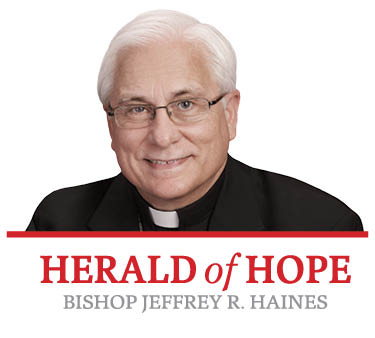 Since the number 3,000 is significant in the sport of baseball for the accumulation of hits, I took special pleasure recently in passing that mark in terms of the number of candidates I have confirmed. I know that such a statistic is rather meager in comparison to other veteran bishops, but it still was quite meaningful – especially since I am finding immense joy in conferring the sacrament on the youth of our Archdiocese of Milwaukee. They truly give me reason for hope.
Since the number 3,000 is significant in the sport of baseball for the accumulation of hits, I took special pleasure recently in passing that mark in terms of the number of candidates I have confirmed. I know that such a statistic is rather meager in comparison to other veteran bishops, but it still was quite meaningful – especially since I am finding immense joy in conferring the sacrament on the youth of our Archdiocese of Milwaukee. They truly give me reason for hope.
Of special note to me lately is observing the manner in which this generation of candidates is approaching the selection of a Confirmation name. There seems to be a resurgence of enthusiasm for the opportunity to choose a name which signals an important new phase of the journey of faith and which establishes a connection with a holy patron from the Communion of Saints. In their Confirmation letters, the candidates often highlight the careful thought and prayer they have devoted to the selection process. Here are some of the trends I am finding as I visit the many parishes of southeastern Wisconsin.
A number of candidates select a name in commemoration of a special relative or dear friend. Quite often, this is someone who has been loved and lost to death or who has long been venerated in the lineage. While such names nearly always retain a biblical or saintly foundation, one still might classify them as a way of remembering the “holy ones” of the family.
Another feature in the current selection of confirmation names is the growing number of names which are not gender specific. In other eras, young men tended toward male saints while young women were inclined to designate a canonized female. This is not necessarily the case nowadays. The choice has less to do with gender and more to do with the nature of the patronage of the saint. Young women considering a career in the medical field are quite comfortable claiming a male saint like Luke, the patron of physicians, while young men with a passion for virtuosity find no problem with affiliating with a female saint like Catherine of Bologna, the patron of artists and the liberal arts.
Some of the candidates for Confirmation develop a special affection for the name of a saint who manifests a virtue or quality which is desirable. For example, those longing for compassion choose the tenderness and care of St. Rose of Lima while those who manifest a bright and cheerful personality look to St. Philip Neri, the patron of merriment and joy.
Still other times, a heritage is given special accord with the selection of a saint who embodies the richness of a beloved culture. Thus, there is the veneration of John of Nepomuk for Czechs, Juan Diego for Mexicans, Patrick for the Irish and Kateri Tekakwitha for Native Americans.
The affinity with an avocation, skill or talent also can play a role in the selection of a Confirmation name by a candidate. Hence, there are proponents of saints like Andrew, the patron of fishing, and Honoratus, the patron of baking and the making of pastry.
There also are some candidates for Confirmation who identify with the names of special saints due to their effort to manage or cope with a difficult health condition. In this category would be saints like Peregrine, the patron of those who suffer with cancer; Dymphna, the patron saint of those who struggle with mental illness; and Lucy, the patron saint of those with eye conditions.
What has been somewhat surprising to me has been the fact that I have not encountered one or two names which have been overwhelmingly dominant. In former eras, it seemed like the majority of young men would select the name Joseph and the young women the name Mary. Perhaps the contemporary fascination with individuality and variety has contributed to a more diverse collection of patrons. However, there still are some names of saints which stand out from among the others. A lot of young people have a passion for sports and music, so two popular names are St. Sebastian and St. Cecelia respectively. The name of Teresa of Calcutta still is somewhat fresh in the modern memory, so she often is a favorite — though it easily could be argued that her solidarity with the poor and respect for the dignity of life likely will remain timeless. The fact that our current Pope, Jorge Bergoglio, selected the name of Francis as the patron of his pontificate may have something to do with its popularity. However, I think it is accurate to suggest that young people today also have a great love for animals and concern for the environment, which was characteristic of the Little Poor Man of Assisi. And, there still seems to be a place in the hearts of young people for St. Michael the Archangel and St. Anthony of Padua, proving that young people of each and every time have a desire for protection and need assistance in finding lost things.
Yet, in the end, the affection which the current candidates for Confirmation have for the Communion of Saints and the desire to select a personal name as part of the celebration of the sacrament bodes well for the Church. It truly seems to be a sign of the longing which this new generation has for the pursuit of holiness.
